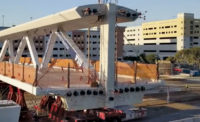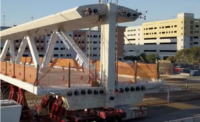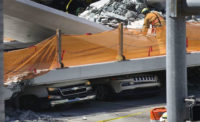Seeking Better Peer Reviews After the FIU Bridge Collapse

On the surface, it seemed like an outrageous defensive move following a painful tragedy. Louis Berger Group has refused requests from the Dept. of Labor to hand over emails with FIGG Bridge Engineers about its peer review of the ill-fated Florida International University pedestrian bridge. The structure collapsed on March 15, 2018, killing six people and injuring several others.
Without legal immunity, there are incentives for both the peer reviewer and the reviewed to skimp on the scope of the work and minimize any trouble or risks.
What purpose could be served by refusing to produce these documents other than to shield Berger from liability?
To be sure, as has been pointed out by the Occupational Safety and Health Administration’s report, Berger and FIGG failed to carry out a meaningful peer review given that the bridge was constructed using the Accelerated Bridge Construction method, wherein it was fabricated off-site and then rolled into position over the road. That by itself required a review of the interim phases of construction and the loads and stresses the move would impose on the structure. In addition to FIGG’s creative choice of a concrete truss and a lack of redundancy, the stresses on the structure during positioning and construction were especially important. Had the scope of the peer review included those temporary conditions, the deadly collapse could have been avoided, OSHA wrote in a report released in June.
The Need for a Legal Shield
Within every tragedy is an opportunity to do better. The key to successful peer reviews lies in matching up the workload, risks and fees in a way that encourages rather than discourages a searching and honest peer review. The way to do that is to shield the peer-review firm from liability in civil lawsuits and keep its documents out of the hands of trial lawyers who will want it for their lawsuits. The effect of such immunity, currently offered only by Missouri and Kansas, would be to encourage deep and honest peer reviews. As things stand now, peer reviews pay a modest fee in exchange for a huge potential liability for any errors. In other words, without legal immunity, there are incentives for both peer reviewer and reviewee to skimp on the scope of the work and minimize any trouble and risks. Indeed, it seems like only a small amount of consideration was given to this peer review.
The peer review done by Berger did generate a few minor suggestions. But the FIU bridge needed modeling of construction-phase loads, questions about the wisdom of the construction method and thoughtful evaluation of all the risks involved. It needed the peer reviewer to be the advocate for public safety and a counterbalance to FIGG’s emphasis on aesthetics and the construction method’s advantages in speed. Legal immunity recognizes the reality of how risk shapes work. Now is the time to seek immunity laws in more states. They will lead to more robust reviews than threats of lawsuits can deliver.



